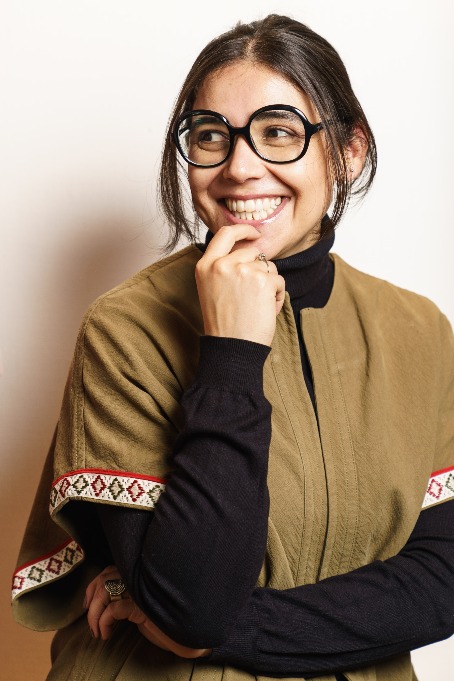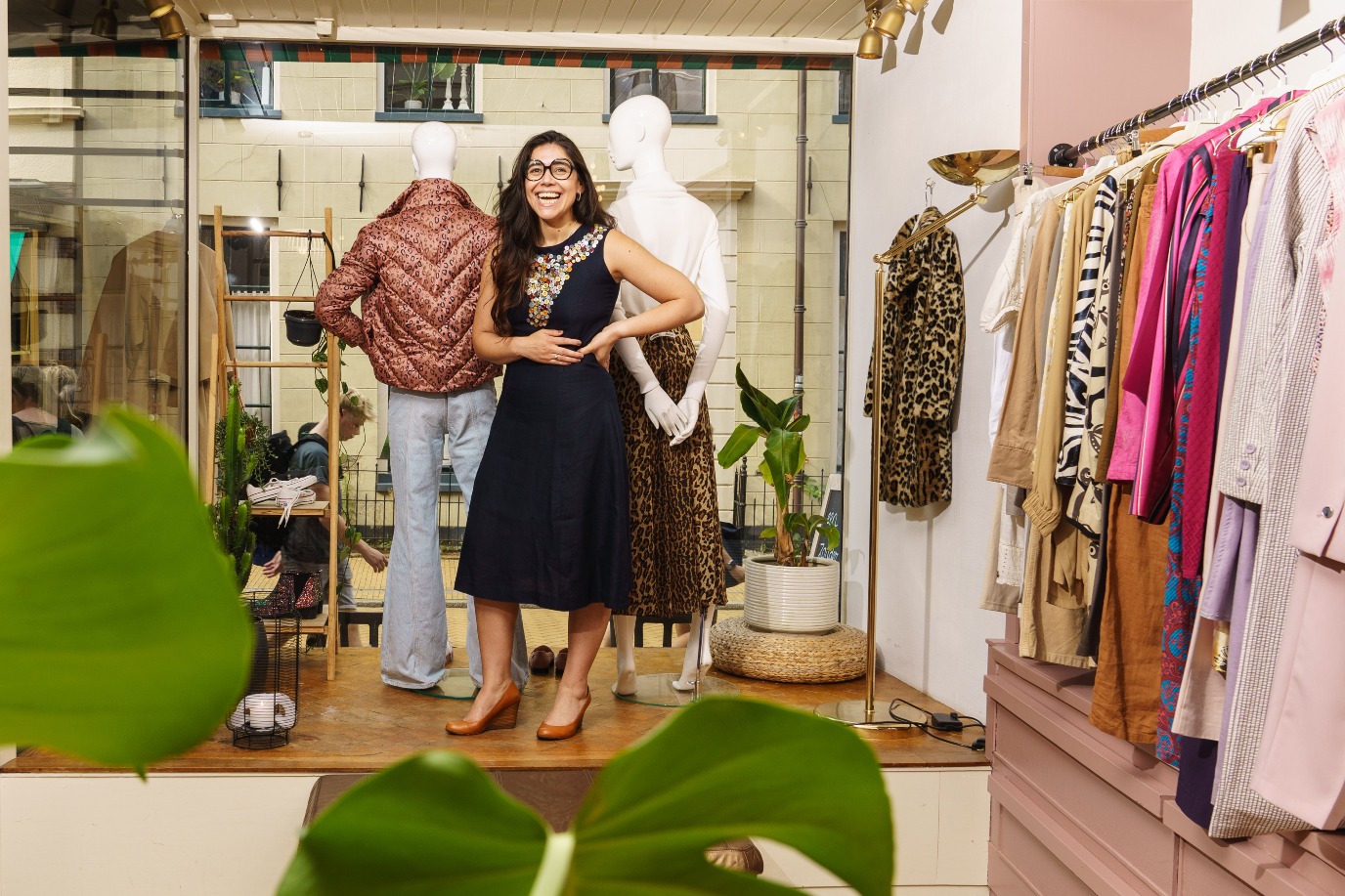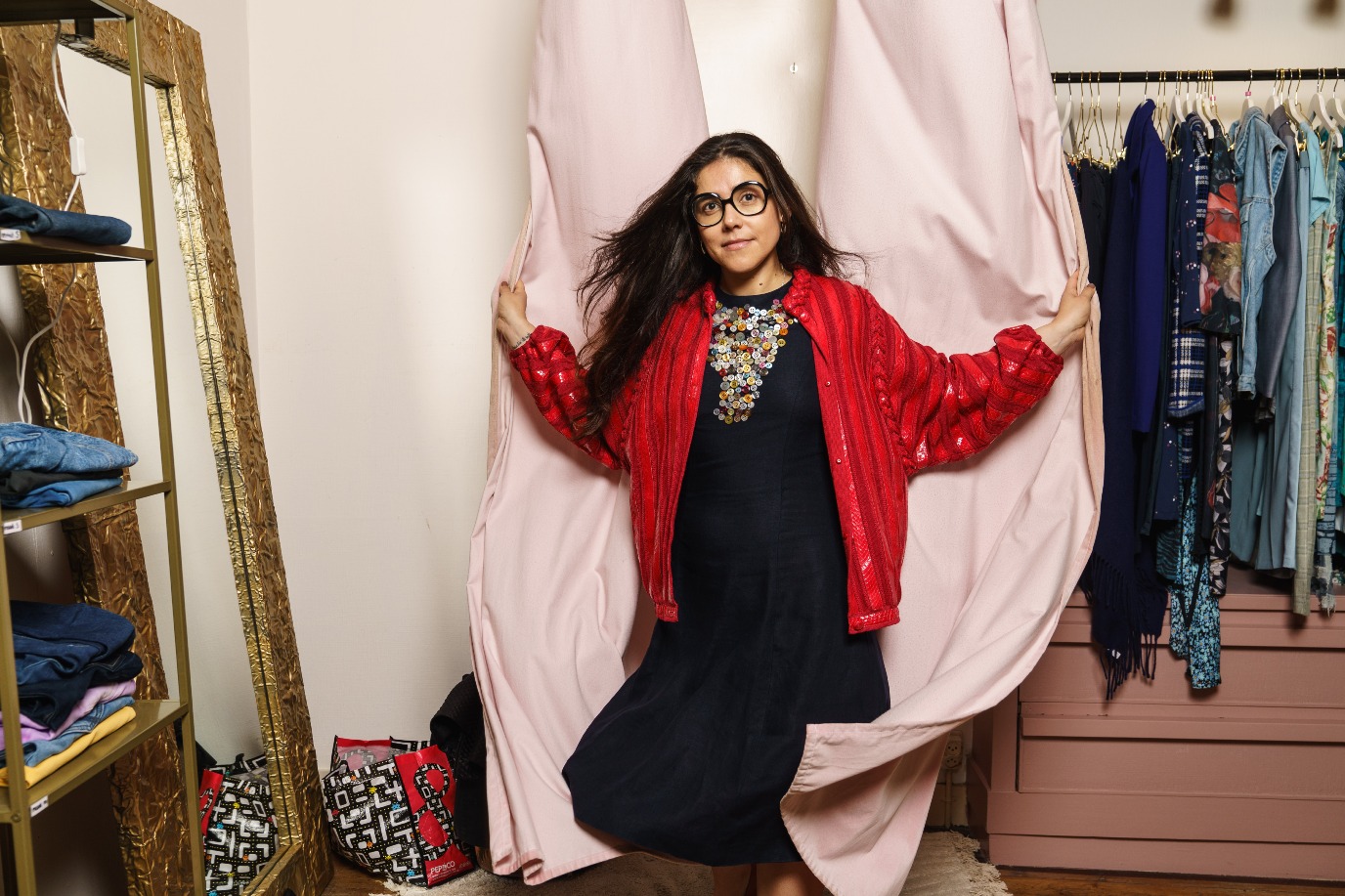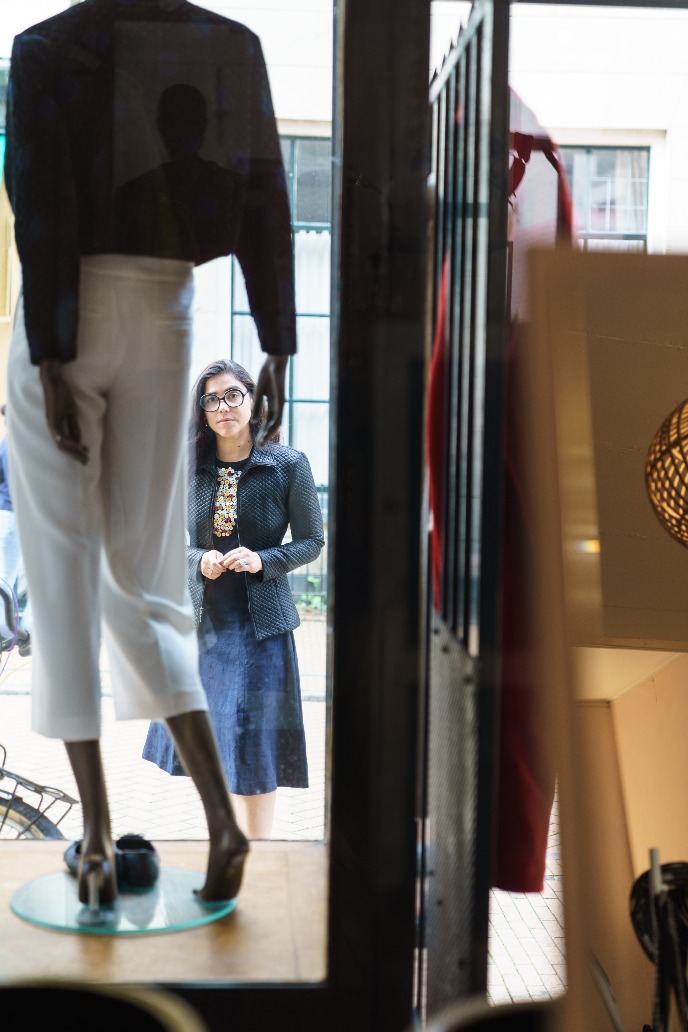Passion for sustainable fashion

Chilean journalist María Pilar Uribe Silva has dedicated half her life to making the clothing industry more sustainable. This summer, she started a PhD project at the RUG. ‘I think it is possible, a more just and sustainable clothing sector. What we need is a different narrative.’
Text: Nienke Beintema / Photos: Reyer Boxem
The fashion industry is one of the largest manufacturing industries in the world, alongside cars and technology. Every year, a hundred billion new items of clothing are released onto the market, many of which are ‘fast fashion’: cheap, poor-quality clothing intended to last just one season. The sector is one of the most polluting in the world, with as much CO2 emissions as the whole of Europe, plus an astonishing amount of waste and water consumption. Two-thirds of clothing is made of nylon or polyester, derived from petroleum. And the vast majority of textile workers work in the Global South, under appalling conditions, in nothing less than modern slavery.
These are facts that could make you cry, or at least despair. María Pilar Uribe Silva shows none of that. The Chilean journalist and researcher is bursting with energy and optimistic fighting spirit. Broerstraat 5 speaks with her in a café in Groningen, where she just can’t stop talking. She speaks like a waterfall, with big facial expressions and gestures.
'We need to address the way people write about sustainability in the fashion industry,' says Uribe Silva. 'Companies, governments, organizations and the media – they all publish so many untruths and misleading claims. It’s impossible to investigate these manually. You need technology for that.' With these words, Uribe Silva describes in a nutshell what she has been working on at the RUG since this summer: a PhD research as a follow-up to her Groningen master’s thesis.

Why did you transition into academia?
'I was super happy with my work: as a freelancer I was writing for all kinds of magazines and organizations, and I was also working as a consultant for small and large companies in the sector. I produced TV programmes related to sustainability issues, and gave masterclasses on sustainable fashion journalism and communications to designers and journalists. And I worked as a volunteer in the second-hand clothing sector. But I didn't think it was enough.'
No? In what way?
'As a global society, we must find a way to bring more accountability and transparency to the clothing industry and all the interconnected industries. This requires facts. There is so much data, when you just look at what companies write in their Corporate Social Responsibility reports. And there are so many media outlets that write about it. But often what they report or write isn’t entirely accurate, or they use deceptive strategies that fall within the spectrum of misleading. There is a big grey area. When exactly do you label something ‘greenwashing’, and why? We need a methodology to define and quantify this. I find that so interesting, challenging and important that I decided to research this from an academic perspective.'
What exactly is your PhD about?
'It explores ways to analyse misinformation or deceptive strategies in company reports using so-called Large Language Models, or LLMs. In fact, these models are the main building blocks of AI chatbots. A chatbot is trained to analyse data, and to be able to say certain things. There are also language models that can learn to recognise and quantify certain information. I would like to investigate to what extent those LLMs can be used to identify deceptive language.'
In your master’s research you did something similar.
'Yes, I investigated to what extent Spanish-language media in Latin America write differently about sustainable fashion compared to media in Spain, and how those two compare to articles generated by AI-based chatbots. More and more media and organizations use bots like ChatGPT to write their texts. Also in the fashion sector. I was able to demonstrate that such chatbots have a Eurocentric bias. In Latin America, human journalists write a lot about small companies that do good things, and why that is important. In Spain, they write much more broadly about fashion trends, markets, and large companies. When you consider that chatbots are typically trained based on texts from Europe, it becomes clear that these chatbots carry a bias. This can cause narratives from the Global South about sustainable fashion to disappear. This can eventually influence the way people perceive fashion.'
Did this inspire you to write your own PhD project?
'No. I finished my master’s in 2023 and continued my freelance work here, from Groningen. My partner and I wanted to stay here: we love the city, it’s really great. I loved my work and I had no intention of going into research at all. But then I was allowed to present my master’s thesis, and also my research on clothing and migration, at the UNESCO World Press Freedom Day Conference. That was a very stimulating experience: I got a lot of positive feedback. And then a PhD position opened up here in Groningen. Not specifically on the clothing industry, but on how to train LLMs to expose misleading or false information. I immediately thought: this is a great opportunity. For years I had been looking for ways to detect that kind of information faster and more efficiently in texts about sustainable clothing. So I applied. I was allowed to give a presentation on this topic and about my ideas, and then I got the job.'
Sustainable city map of Groningen
The Green Office of the UG has developed a sustainable city map of Groningen, with second hand stores, food spots, sustainable initiatives and clothing shops.
Are there actually any rules about greenwashing?
'There are rules, and new regulations are coming, but they are open to all kinds of interpretations. That’s why we need better laws. But in order for that to happen, a lot of people need to understand why that is necessary. How this industry is destroying our planet and our people. All this pollution, all the resources it requires, all those bad working conditions... along the entire chain from raw material to waste. Many people say that this needs to improve, but still far too little is happening. We need to do more. Language and communication can play a major role in this.'
Yes? How?
'People don’t usually realise it, but language and information – in the form of journalism, communication, press releases, annual reports – are the foundation of our society, our human rights, our democracy. There is a long historical record that shows this. But at the same time, journalism and communication seem to focus just on economics and politics. Much less on issues such as sustainability and social justice. This can only change if we ensure that the facts are widely known. The facts, not the deceptive information.'

You studied journalism, you are not a technician. How can you work on computer models?
'Of course, I am not doing this research alone. One of my supervisors, Rik van Noord, is an expert in computational linguistics, and a member of the incredible group of people at the Centre for Language and Cognition. In addition, before we start working with AI or LLMs, we first have to define the concepts of ‘deception’ and ‘greenwashing’. This requires expertise in language, law, and philosophy, which is where my other supervisor, Erika Darics, comes in. So, this is an interdisciplinary project that brings together various areas of expertise. My role is to design a framework and methodology that integrate all these elements.'
And in the meantime, you continue to work in practice.
'Yes, I still give masterclasses to designers and journalists, and I am an active part of different NGOs and social organisations such as Fashion Revolution Chile. There is still so much to do... It is not just about clothing as a utility object. Clothing is also about identity, about culture, about human rights. And for me, it is also about meaning, and about a passion for colours, textures, patterns... Fashion as a concept is fascinating and it touches on our core as human beings. But at the moment, it is not sustainable as an industry. We need to rethink fashion as a concept. This contradiction is something that fascinates me.'

Do you think it is possible to change the clothing sector?
'Yes, because otherwise I would not dedicate my life to this. I think it is possible: changing this and other harmful industries through language and communication. Because what we need is a different narrative. A narrative that tells the whole story, not just about trends but also about social and ecological sustainability. About how a product is connected to the land and the people, and how the industry impacts everything around us. A narrative, in other words, that puts quality above quantity. It must become normal to wear second-hand clothes, and clothes that you’ve owned for twenty years. Those often have the most character, too. And there are stories attached to them. Those aspects also have value.'
María Pilar Uribe Silva (Chile, 1986) studied journalism in Chile. She worked as a freelance journalist, TV producer and consultant for media, NGOs and governments in Chile, Spain, Italy, Romania and Ireland. Her focus has always been sustainability in the fashion industry. In 2022-2023 she obtained a master’s degree in Digital Humanities in Groningen. She wrote her thesis on digital techniques for large-scale analysis of texts about the fashion industry. In summer 2024 she started a related PhD project.
This article has been taken from our alumni magazine Broerstraat 5.
More information
-
Endowed Professor of Regional and Circular Economic Development Kim Poldner and Ellen van der Werff, Associate Professor in the psychology of environment-friendly behaviour change, are also doing research on sustainable clothing at the RUG. Read the article From Fast Fashion to Green Fashion
| Last modified: | 09 October 2024 2.07 p.m. |
More news
-
12 March 2025
Breaking news: local journalism is alive
Local journalism is alive, still plays an important role in our lives and definitely has a future. In fact, local journalism can play a more crucial role than ever in creating our sense of community. But for that to happen, journalists will have to...
-
11 March 2025
Student challenge: Starting Stories
The Challenge Starting Stories dares you to think about the beginning of recent novels for ten days.
-
11 March 2025
New: Sketch Engine, tool for language research
Sketch Engine is a tool for language research, which can also be used for text analysis or text mining.
